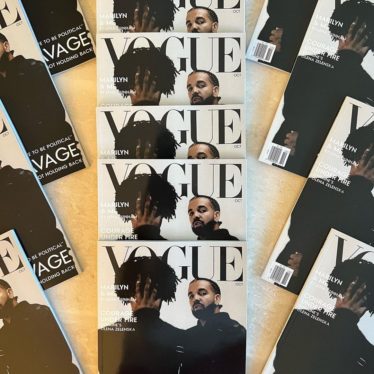Condé Nast has reached a settlement to end a lawsuit against Drake and 21 Savage over their use of a fake Vogue magazine cover to promote their album Her Loss, Billboard has confirmed.
The agreement, first reported by the news site Semafor, includes a permanent injunction barring any further use of Condé Nast’s Vogue trademarks, as well as an undisclosed monetary payment from Drake and 21.
In an internal email independently obtained by Billboard, Condé Nast general counsel William Bowes said the company was “glad to put this matter behind us” but explained why the publishing giant had felt the need to file the lawsuit against the two rappers.
“As a creative company, we of course understand our brands may from time to time be referenced in other creative works,” Bowes wrote in the note. “In this instance, however, it was clear to us that Drake and 21 Savage leveraged Vogue’s reputation for their own commercial purposes and, in the process, confused audiences who trust Vogue as the authoritative voice on fashion and culture.”
Representatives for Drake, 21 Savage and Condé Nast all declined to comment.
The fake Vogue cover was part of a broader phony media blitz from the two stars, aimed at promoting the November launch of their album Her Loss. They also released a fake Saturday Night Live performance, teased a similar fake appearance on NPR’s Tiny Desk series and created an elaborate deepfake interview with Howard Stern.
NPR and Stern both publicly embraced the joke, but Condé Nast wasn’t laughing about the fake Vogue cover.
In a lawsuit filed Nov. 7 in Manhattan federal court, the publisher called the stunt a “flagrant infringement” of the company’s trademark rights, aimed at exploiting the “tremendous value that a cover feature in Vogue magazine carries” without actually securing that honor. Condé specifically pointed to Drake’s Instagram post teasing the fake cover story, in which he personally thanked famed Vogue editor Anna Wintour.
“Vogue magazine and its Editor-in-Chief Anna Wintour have had no involvement in Her Loss or its promotion, and have not endorsed it in any way,” the company’s lawyers wrote at the time. “Nor did Condé Nast authorize, much less support, the creation and widespread dissemination of a counterfeit issue of Vogue, or a counterfeit version of perhaps one of the most carefully curated covers in all of the publication business.”
Just days later, a federal judge largely agreed with Condé Nast, issuing a preliminary injunction forcing the stars to pull down all references to the fake Vogue cover. The judge said the faux cover likely violated the publisher’s trademarks by “misleading consumers” and “deceiving the public.”
In the internal letter announcing the settlement, Bowes said Condé Nast had repeatedly attempted to resolve the dispute without resorting to litigation but had been “left with no other option” after the superstars ignored their requests to stop.
“We have a fundamental duty to protect our IP when it’s clear that it’s being used without permission for something other than serving our audience,” Bowes wrote in the letter.
A formal notice of settlement has not yet been filed in the federal court overseeing the lawsuit.
https://www.billboard.com/pro/drake-21-savage-settle-fake-vogue-cover-lawsuit/





